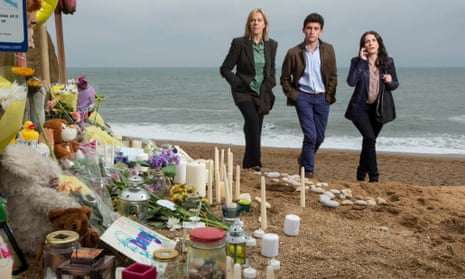This series of Broadchurch, just like the first, garnered plenty of media coverage and opinions. After the early storms (Mumblegate! Music-too-loud-gate! Ratings-wobble-gate!), the hunt was on for a new angle. I made a deliberate decision not to comment during transmission, and all the above were rightly refuted by other commentators. But now the series has finished, there’s one issue I do want to address: Legalgate!
There’s been plenty of discussion over the accuracy of our portrayal of the trial process. Some argued our court story would never happen. Our research and advisors suggested otherwise. Let me explain our process.
The story was devised as the result of months of research and consultation. Before we started to plot or write, we researched trials of the past 20 years and attended criminal proceedings. Alongside a respected police adviser from the first series, we brought on highly qualified, experienced and practising members of the legal profession.
We asked them: if Danny’s murder were to come to court, how would this trial proceed? How would you prosecute this case? How would you defend this case? What are the possible outcomes? The shape and detail of the series was based on their responses. As I wrote, all three advisers (legal and police) were continually consulted. They read and gave notes on every script. We knew our decisions would be chewed over. And they were.
Critics argued the defence wouldn’t be allowed to suggest Mark Latimer as an alternate killer. Our advisers were – and remain (I checked) – adamant on this: if they were defending, they could and would run this approach. Others thought the cross-examination of Ellie Miller in the witness box was unrealistic: our police adviser told me, after watching: “I’ve been there, that’s exactly what it’s like.” Of course, in the legal profession, every opinion is open to argument. But we were not cavalier.
Both these moments spoke to the central concern of the series. One issue that recurred during my research was the treatment of families. Following the trial of Levi Bellfield for the murder of Milly Dowler in 2011, Victim Support’s chief executive Javed Khan said: “There is a danger that [victims of crime] become re-victimised and feel as if it is them on trial rather than the accused”. Proposals for change were put to the justice secretary – and yet in 2013 the former director of public prosecutions Keir Starmer told the Today programme: “Most victims have a pretty awful journey through the court process.” He added that England needed “to have a system fit for victims and witnesses, and we don’t at the moment”. Even last month, the current DPP, Alison Saunders, announced another consultation on the matter, saying: “I do think that we can make the courts fairer for victims and witnesses.”
Broadchurch has always been about the impact of crime, on all those affected. The research made me wonder how our characters would fare under the rigours and vagaries of a trial. What’s the emotional cost to witnesses and the families of victims in an adversarial system? It was a story I hadn’t seen and one I wanted to explore.
I knew it would be a big risk to develop and reshape the show this way. It would also mean taking a different approach to legal drama: favouring the experience and point of view of the victim’s family. So court scenes would only be one component. We’d only show fragments from the court; we wouldn’t depict every witness, objection, legal argument, or cross-examination. Instead, we’d spend as much time with the emotional fallout in the entrances and corridors of the court, as in the courtroom itself.
That choice meant complex procedure had to be compressed. Hospital dramas condense seven-hour operations into two minutes of crisis. Police dramas condense investigations in the same way. Legal procedure is opaque. Murder trials often last around four weeks. So exact process and wording has to be dramatised.
Every writer has compressed time and procedure, and used clarifying dialogue. That’s not a scandal: it’s a legitimate dramatic technique. Drama is not a literal portrayal of events. It’s a depiction, it’s impressionistic.
Writers are not just allowed but are required to make those creative decisions. It’s our job. Lawyers have howled their objections in the press (they’re professional advocates, after all). That’s fine. Such criticism is not unique to Broadchurch: legal dramas have always been attacked by lawyers. We knew it would happen and were steeled for it. Our advisers gave us accurate, exemplary guidance, while also understanding that this was a drama. They’re happy with the results, and proud to be the advisers on the series. We all stand by our decisions.
Despite all the noise, despite the fact we took a big creative risk in our second series, our audience of more than nine million came with us, and stayed. They understand that drama evokes life by compressing procedure, detail and emotion into 46-minute episodes. Some enjoyed the second series less than the first: that’s definitely allowed. We’re now working on the third series. It will be different again. There’ll be plenty more to discuss.
